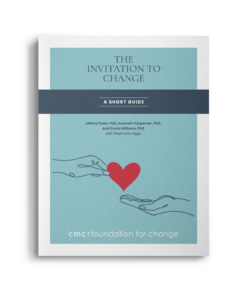“You are taking advantage of me.”
“You don’t respect me or my time.”
“Why do you keep doing this to me?”
These are all things that I said to my daughter before I learned about boundaries. When I learned that people with boundaries can be more compassionate because they don’t feel taken advantage of, it sparked a major realization for me. I was doing things I didn’t want to do, then blaming my daughter even though I chose to do them! I was the one in control. I could make different choices. When I was blaming her for how I felt, it led to resentment and distance for both of us.
When my daughter first started misusing substances, I knew I needed to change my approach to parenting, but I wasn’t sure how. She was such an easy kid to raise until that point. I kept trying to approach her substance abuse with actions that worked before. The results were not good. My research about what to do lead me to boundaries. I was not immediately on board with the idea. My beliefs about boundaries were incorrect, and I had seen them misused. I saw them used to control other people’s behaviors, as ultimatums, punishment, or manipulation. I hadn’t seen many examples of boundaries that were set with love and respect.
I was experiencing enough pain and discomfort to give it a try even though I didn’t have faith it would work. I realized there was discomfort either way though. I chose the short-term discomfort of trying something new that would hopefully result in long term peace in my life.
I started by setting loving boundaries that were clear and direct. My reaction to a boundary violation had to be clear and direct as well. I knew if I didn’t follow through, I was making a threat and not setting a boundary. Doing that, changed my relationship with my daughter for the better. I also felt better as a mom because I was able to let go of my resentment and anger about doing things I didn’t want to do. The change in my relationship with my daughter did not happen overnight. When I first started setting boundaries, she was angry at me and resisted them. The key was my consistency. Eventually her anger passed, she accepted them, and they were no longer an issue between us. I had to push through my discomfort though.
Here is the simple way I set a boundary:
The Request – If you do this ____________
The Consequence- Then I will do this ____________
Example of a request with my daughter: If you keep coming home past your curfew
Example of a consequence with my daughter: I will take away your car for one week
When she came home past curfew again, I calmly followed through by taking her car keys and reminding her that she could not use the car for one week. I allowed her to get upset, but I didn’t have to engage or try to control her reaction. I didn’t have to yell, argue, lecture, or get angry.
Boundaries also allow choices. My daughter got to choose her behavior. She could follow the boundary or not follow it knowing there would be a consequence. I am not controlling her when I set a boundary. I am only controlling me and my reaction to her not following the boundary.
I found that asking myself the following four questions and being honest with myself about the answers very helpful:
1. Is a boundary appropriate in this situation or should I consider compromise?
2. What is my fear of setting this boundary?
3. What is the benefit of setting this boundary?
4. Am I coming from a place of love and clear communication or am I trying to control, manipulate, or punish?
If I was still struggling, I would think about instances where clear boundaries make life easier and I appreciated them. I would Imagine what it would be like if I didn’t know what my boss expected of me at work. If expectations were unclear, I would be confused. Knowing what is expected makes life and relationships easier to navigate.
The last thing about boundaries is they can change as I change. They are meant to work for me. If I realize that circumstances have changed then I can change my boundary. Without boundaries it is easy to lose sight of where I end, and my daughter begins. Boundaries keep my focus on me and what I can control in my life.
This guest post was written by Heather Ross. You can find more of her work at heatherrosscoaching.com




